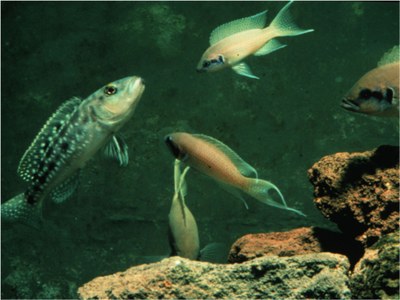Cooperation and Social Behaviour
Have you ever wondered why lions live in groups (prides) while leopards or tigers live a more solitary lifestyle? Even within a single species, individuals may vary with respect to how much they want to affiliate and socialize with others and how much they will cooperate with other members of their group. We study this variation among species and between individuals and want to better understand the evolution of social behaviour and to explain the degree of cooperation and conflict observed in social groups.
We use cichlid fish for this work. Cichlid fishes are a family of tropical freshwater fishes. This group is ideal for cross species studies because they not only come in a dazzling array of shapes, colours and sizes, but they also are extremely diverse in their behaviours. Also the extremely rapid speciation that has occurred in this fish family has drummed up a great deal of interest and research effort on these particular fishes. As a consequence, there is excellent knowledge of genetic relationships between species and many molecular tools with which to study these fishes. We know that some cichlid fish live in groups others do not, some species are cooperative and others are not. We want to know why such differences exist. To understand the diversity in behaviour we explore many factors from neurons to neighborhoods that might help us better understand the evolution of complex social behaviour and in particular we investigate these species’ life history, demography, genetics neurobiology and physiology for clues about the selecting agents for complex social behaviour.
 See the Photo Gallery of ABEL work on this topic
See the Photo Gallery of ABEL work on this topic
Here are a few representative ABEL papers on this topic:
-
Hick, K, Reddon, A, O'Connor, C, and Balshine, S, 2013. "Strategic and tactical fighting decisions in cichlid fishes with divergent social systems". Behavior
-
Dey, CJ, Reddon, AR, O'Connor, CM, and Balshine, S, 2013. "Network structure is related to social conflict in a cooperatively breeding fish". Animal Behaviour, 85(2), 395-402
-
Reddon, AR, O'Connor, CM, Marsh-Rollo, SE, and Balshine, S, 2012. "Effects of isotocin on social responses in a cooperatively breeding fish". Animal Behaviour, 84(4), 753-760
-
Wong, M and Balshine, S, 2011. "Fight for your breeding right: hierarchy re-establishment predicts aggression in a social queue". Biology Letters, 7(2), 190-193
-
Wong, M and Balshine, S, 2011. "The evolution of cooperative breeding in the African cichlid fish, Neolamprologus pulcher". Biological Reviews, 86(2), 511-530
-
Stiver, KA, Dierkes, P, Taborsky, M, Gibbs, HL, and Balshine, S, 2005. "Relatedness and helping in fish: examining the theoretical predictions". Proceedings of the Royal Society B-Biological Sciences, 272(1572), 1593-1599

